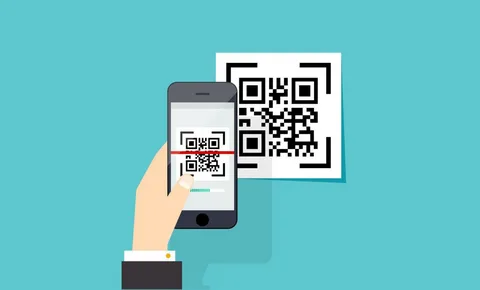Importance of QR Codes in Registration of Vehicles

Strong 8k brings an ultra-HD IPTV experience to your living room and your pocket.
In the modern world, technology is shaping the way various administrative processes are handled. One of the areas where technological advancement has made a significant impact is in vehicle registration. The use of QR codes in the registration of vehicles has brought efficiency, security, and convenience to both authorities and vehicle owners. QR codes, or Quick Response codes, are two-dimensional barcodes that store data in a machine-readable format. These codes have become an essential tool in the automotive industry, facilitating faster access to vehicle details, streamlining regulatory processes, and enhancing security.
How QR Codes Work in Vehicle Registration
QR codes function as unique digital identifiers assigned to each registered vehicle. These codes contain essential details such as the vehicle’s registration number, owner information, chassis number, insurance details, and roadworthiness certification. The implementation of QR codes in vehicle registration allows authorities to scan and verify details instantly using smartphones or specialized scanning devices.
In countries where QR codes are integrated into vehicle registration systems, vehicle owners receive a QR code upon successful registration. This QR code is either printed on registration documents, displayed on number plates, or embedded in the vehicle’s smart registration card. The widespread use of QR codes in this sector enhances data accessibility and minimizes the risks associated with fraudulent activities.
Advantages of QR Codes in Vehicle Registration
1. Enhanced Security and Fraud Prevention
One of the biggest challenges in vehicle registration is the prevalence of fake or duplicated registration documents. QR codes provide an additional layer of security as they store encrypted vehicle details that are difficult to forge. Since the data contained in a QR code can be verified instantly by scanning, it reduces the chances of fraudulent activities, such as vehicle cloning or fake license plates. Law enforcement agencies can swiftly verify vehicle details in real-time, ensuring greater compliance with regulations.
2. Efficient and Quick Verification Process
Traditionally, verifying a vehicle’s registration details required manual checking of paperwork, which was time-consuming and prone to errors. QR codes eliminate this inefficiency by providing instant access to information through scanning. Whether it’s traffic police verifying a vehicle’s registration status or a vehicle buyer confirming ownership details, the QR code simplifies the verification process significantly.
3. Digital Record Keeping and Paper Reduction
With QR codes, vehicle registration data can be stored digitally, reducing the dependency on physical documents. This transition to digital record-keeping not only saves resources but also ensures that vehicle details are easily retrievable in case of lost or damaged paperwork. Additionally, minimizing paperwork contributes to environmental sustainability by reducing paper waste.
4. Easy Integration with Other Digital Systems
QR codes seamlessly integrate with digital databases, mobile applications, and online portals used by transportation authorities. Governments and private agencies can link QR codes to national vehicle registries, insurance databases, and emission control records. This integration enhances interoperability between different regulatory bodies and makes it easier for vehicle owners to manage their records online.
5. Faster Processing of Traffic Violations and Fines
Law enforcement agencies can use QR codes to streamline the issuance of fines and penalties for traffic violations. Instead of manually entering vehicle details when issuing a citation, officers can scan the QR code to retrieve information instantly. This reduces administrative burdens and ensures accurate recording of offenses.
6. Convenience for Vehicle Owners
For vehicle owners, having a QR code linked to their registration details means they do not need to carry multiple documents for verification purposes. In case of vehicle resale or ownership transfer, potential buyers can quickly scan the QR code to verify the authenticity of the registration details, making transactions more transparent and secure.
7. Support for Contactless Transactions
Amidst the growing need for contactless solutions, QR codes offer a safe way to handle vehicle registration processes without physical interactions. This is particularly beneficial in scenarios where online applications, payments, and document verification are required. Government agencies can implement QR-based registration processes, reducing the need for in-person visits to registration offices.
Global Adoption of QR Codes in Vehicle Registration
Many countries have already adopted QR codes in vehicle registration to enhance efficiency and security. For example:
India: The Ministry of Road Transport and Highways introduced High-Security Registration Plates (HSRP) that contain QR codes to prevent vehicle theft and fraudulent registrations.
China: QR codes are widely used in vehicle permits and insurance stickers, ensuring quick access to vehicle-related data.
United States: Some states have started integrating QR codes into vehicle registration documents to facilitate digital record-keeping.
European Union: Several EU countries have explored the use of QR codes in digital vehicle registration certificates to comply with stringent security regulations.
How to Generate QR Codes for Vehicle Registration
To implement QR codes in vehicle registration, authorities and vehicle owners can use reliable QR code generation tools. One of the most efficient and user-friendly solutions is The QR Code Generator. This platform allows users to create customized QR codes that can store vehicle details securely. The generated QR codes can be printed on registration certificates, number plates, or digital vehicle documents for easy scanning and verification.
Using The QR Code Generator, authorities can:
Create secure and tamper-proof QR codes for vehicle registrations.
Customize QR codes with unique identifiers and encryption features.
Ensure that the stored data is accessible only through authorized scanning applications.
Future of QR Codes in Vehicle Registration
The future of vehicle registration is undoubtedly digital, with QR codes playing a vital role in modernizing the process. As technology continues to evolve, additional features such as blockchain integration and real-time GPS tracking could further enhance the security and efficiency of vehicle registration systems. Moreover, advancements in AI and machine learning could enable QR codes to provide predictive analytics for vehicle maintenance, insurance claims, and legal compliance.
Governments worldwide are recognizing the potential of QR codes in transportation management and are expected to increase their adoption in the coming years. With continued innovation, QR codes will remain a fundamental part of vehicle registration and tracking systems, ensuring seamless connectivity between vehicle owners, regulatory authorities, and law enforcement agencies.
Conclusion
The integration of QR codes in vehicle registration has revolutionized the way vehicle details are managed, verified, and secured. These digital codes provide numerous benefits, including fraud prevention, faster verification, paper reduction, and easy integration with digital platforms. Governments, transportation agencies, and vehicle owners can leverage QR code technology to streamline registration processes and enhance security.
With reliable solutions such as The QR Code Generator, implementing QR codes in vehicle registration has never been easier. As the automotive industry moves towards digitalization, QR codes will continue to play a crucial role in ensuring a more efficient, transparent, and secure vehicle registration system.
Note: IndiBlogHub features both user-submitted and editorial content. We do not verify third-party contributions. Read our Disclaimer and Privacy Policyfor details.







